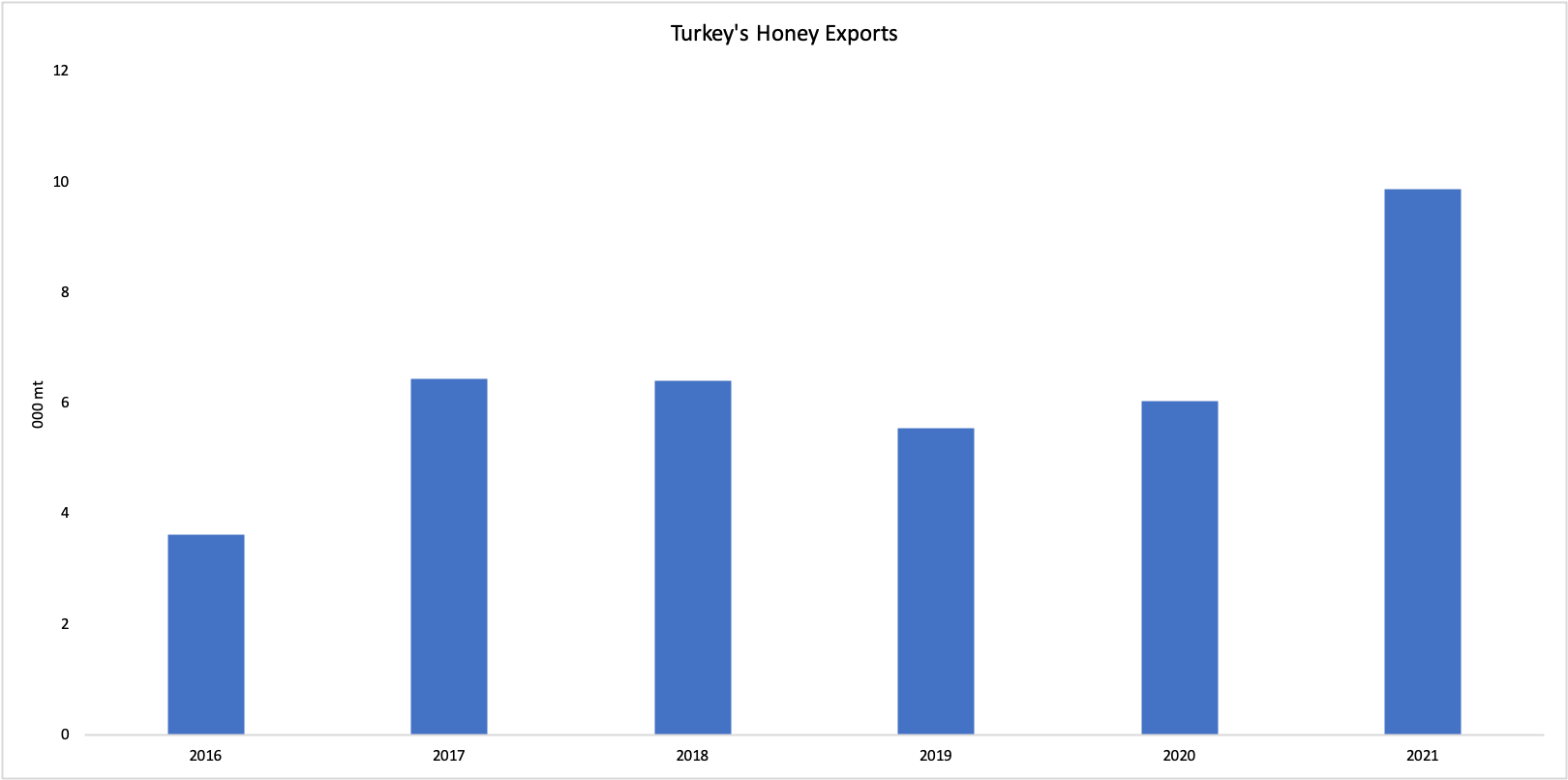Turkey’s Honey Exports Record YoY Increase of 63% Despite Lower Production

Bee rearing and honey production have been a key industry in Turkey since 1300 BC, making it one of the oldest and largest honey producers in the world. Currently, Turkey ranks second in the world after China in honey production with an average output of roughly 100 thousand mt per year. Honey production has grown at a very fast rate in Turkey from 103.52 thousand mt in 2015 to 109.33 thousand mt in 2019. Turkey is one of few self-sufficient countries in beekeeping that produces a number of honey varieties including acacia, chestnut, citrus, lavender, pine, thyme, and wildflower honey. Driven by the demand in the global market, Turkish beekeepers have also started cultivating bees for honey varieties that are popular for nutritional and medicinal purposes like royal jelly, pollen, propolis, and bee venom.
The year 2021 was not favorable for honey production in Turkey due to widespread forest fires which turned Turkey’s lush green forests into ashed and barren hills. The Turkish beekeepers lost to the fire all components integral to the production of honey, including thousands of hives, bees, and trees. The forest fires were a major blow to Turkey’s honey industry, and its impacts are set to be long-standing. It was estimated that around 66 thousand ha of forest land were lost to the fires; financial loss associated with honey is estimated to be at USD 100 million. The honey industry had anticipated Turkey to cut back on its honey exports in 2021 to meet the growing domestic honey demands after honey-producing was impacted by forest fires. Nevertheless, Turkey recorded an increase in honey exports in 2021, with a YoY increase of 63.4% in volume and an 18% increase in value over 2020.
According to data from the Eastern Black Sea Exporters Association (DKİB), 9.87 thousand mt of honey was sold from Turkey to approximately 55 countries in 2021. The value of honey exports stood at over USD 30 million with the majority of the exports sent to the U.S., followed by Germany, Spain, Bulgaria, and Israel. Turkey also started exporting honey to new countries like Italy, Morocco, Egypt, Mongolia, Venezuela, Pakistan, Kenya, and Ireland. This increase stood in contrast to the grim expectations framed after the September 2021 forest fires which had severely impacted Turkish honey production. Turkey’s higher honey exports were likely driven by the demand for food supplements, including mixtures containing honey, which increased due to the pandemic.

Source: ITC Trademap.HS Code: 0409.
Despite production setbacks, Turkey managed to record a YoY increase in both exports volumes and values. It is projected that the global honey market will reach USD 11.88 billion in industry, contrary to USD 8.17 billion in 2021. The outlook for Turkey’s honey industry remains positive given the dynamic global honey market and growing demand for honey due to its immunity-boosting, antibacterial and antiviral properties. Demand for honey has also increased due to its ability to act as a natural and healthier substitute to conventional sugar. Large honey importing markets like Europe, the U.S., and Japan, in particular, will drive the demand and give opportunities to niche producers like Turkey to expand their footprint in the global market.
Sources
- AA. “Turkish honey will be exported to 55 countries in 2021.”
- Fortune Business Insights. “Honey Market.”
- HoneyBeeClever. “Turkey the Second-largest Honey Producer Worldwide.”
- ITC TradeMap. HS Code: 0409.
- Tridge. “Forest Fires Impact Turkey’s Famous Pine Honey.”





